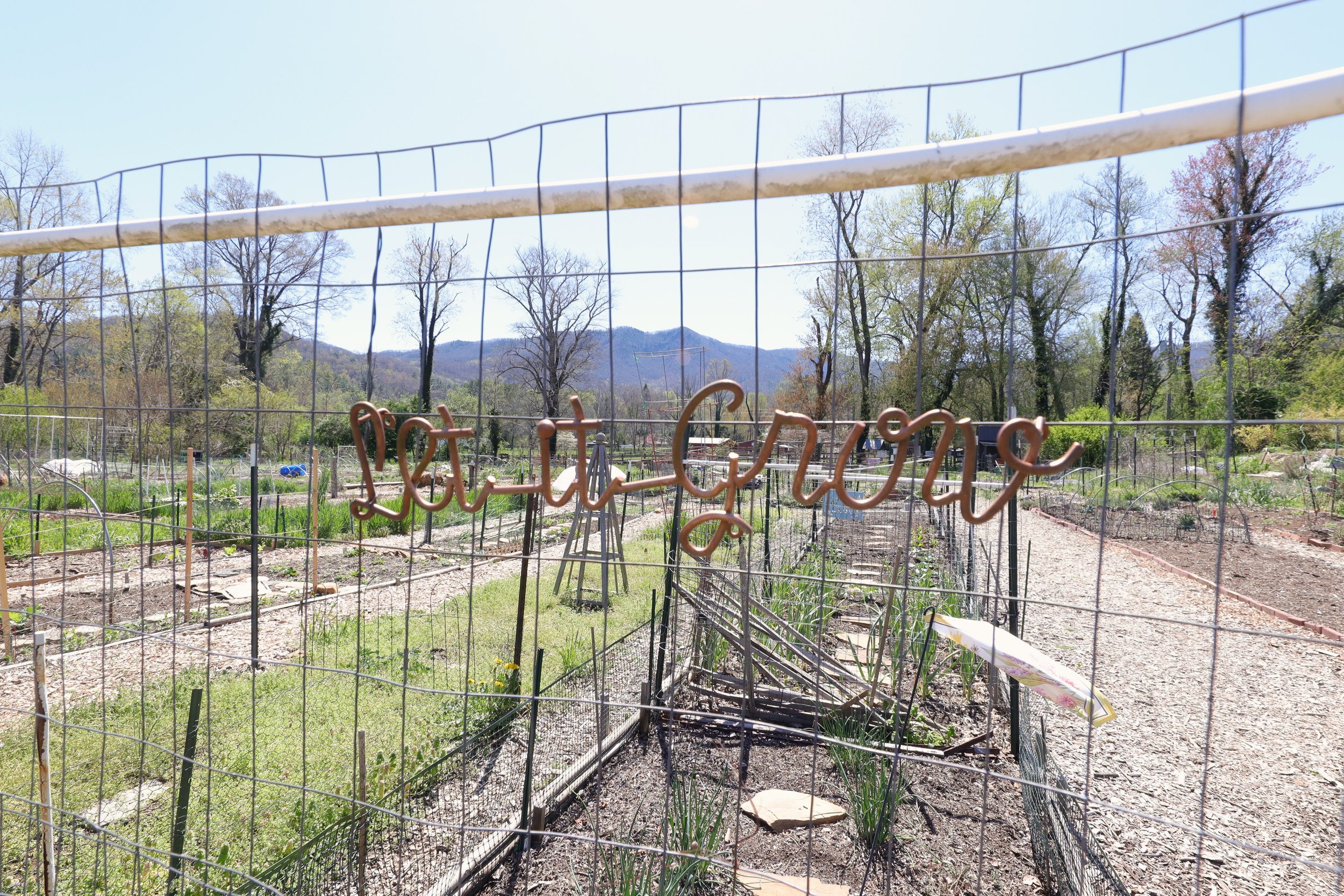A Visit in the Valley at the Dr. John Wilson Community Garden
Town institution focuses on safety and sustainability after Helene
Fred McCormick
The Valley Echo
April 9, 2025
Manager Leonora Stefanile tends to a crop of bok choy, April 9, in the Dr. John Wilson Community Garden. Photo by Fred McCormick
For more than two decades, the adjacent Swannanoa River has generally served as a scenic neighbor of the Dr. John Wilson Community Garden, on the south side of the Town of Black Mountain’s Veteran Park.
Even when the ancient body of water raged during Tropical Storm Helene last September, the garden that produces thousands of pounds of food each year escaped destruction, but addressing a prevailing concern about the water quality of the river has emerged as the top priority.
The garden, which celebrated its 20th anniversary a month before the storm, was founded by the doctor and longtime Black Mountain resident from whom it takes its name before he passed away in 2016. It flourished under the management of Diana McCall for 18 years, becoming an official town program with a permanent manager in 2010.
When current garden manager Leonora Stefanile stepped into the role last December, following the departure of her predecessor Lucille Nelson, she quickly began assessing a rapidly evolving list of concerns.
Visible damage from the storm was isolated to one small area of the garden, which contains more than 100 plots.
“in some ways we were very blessed, because we have a section of beds in which the interns and manager grow produce that is donated to Bounty & Soul,” Stefanile said. “Half of those beds were flooded, so we’re going to grow cut flowers there until we have funding to do soil testing to determine whether it's safe to grow food there.”
In the early weeks of spring, the remainder of the garden is producing food, as new and returning gardeners continue wo tend their plots, but poor water quality in the Swannanoa River is diminishing yields.
Most of the Dr. John Wilson Community Garden, which is owned and operated by the Town of Black Mountain, escaped physical damage during Helene, but water quality concerns in the Swannanoa River are a top priority. Photo by Fred McCormick
“Since the garden began, the irrigation source has been unfiltered surface water from the river,” said Stefanile, whose work has focused on local food through sustainable agriculture for 15 years. “But, when you really think about it, a lot has changed, in terms of contaminants in the river, over the last 20 years.”
Flooding from Helene exacerbated existing contamination concerns in the river, according to the garden manager.
“We were putting together a plan to add a filtration system to the pump system that brings the water from the river to garden, but after Helene that didn’t seem practical,” Stefanile said. “We had a food safety specialist with the N.C. State University Cooperative Extension come out and she advised that our best and safest option is to dig a well and avoid using the river water.”
A section of the river upstream from the garden has consistently tested positive for elevated levels of E. coli since last summer, she added.
“That’s not a temporary issue, elevated E. coli isn’t going away after the storm,” Stefanile said. “The need to treat, filter and test water from the river involves a lot of maintenance and expense, so a well would be more cost effective in the long-term.”
The garden, which has been irrigating its crops with water from a tanker that is filled weekly by the public works department and rainwater collected from nearby Grey Eagle athletic facility, is pursuing funding for a well through the Community Foundation of WNC.
The Dr. John Wilson Community Garden, located on the south side of Veterans Park in Black Mountain, was founded in 2004. Photo by Fred McCormick
“Hopefully, it will cover the installation of a well in the garden,” Stefanile said. “It might also be able to fund a produce-washing station and drip irrigation system. You can never water as much by hand as you can with a drip irrigation system.”
The infrastructure would allow the garden, which donates around 6,000 pounds of produce to local nonprofit organization Bounty & Soul each year, to increase its output.
While the lack of an appropriate water source has caused the garden to scale back some of its programming, according to the manager, crops are continuing to flourish. A requirement for gardeners to donate 10% of their harvests has been made optional until the water supply is increased.
“We are still growing a bunch of crops in our donation area, and we’re wrapping up registration for the season,” she said. “Things are definitely moving along, but we’re seeing a shift in our priorities after Helene.”
A recent project, initiated by volunteers from Warren Wilson College, planted live native willow cuttings along the Swannanoa River to stabilize the soil, while the garden has filled both positions in annual intern program. Educational workshops and guest lectures will be offered throughout the season.
“Right now, I just want to do our best on focusing on one thing at a time, and build a strong foundation, brick by brick,” Stefanile said. “A well and irrigation system would be a big step in that process.”
This story is an installment of “A Visit in the Valley” series, highlighting Swannanoa Valley businesses, nonprofit organizations and community groups in the aftermath of Tropical Storm Helene. Each piece explores the experiences, challenges and triumphs of local institutions, as the area recovers from the natural disaster.



